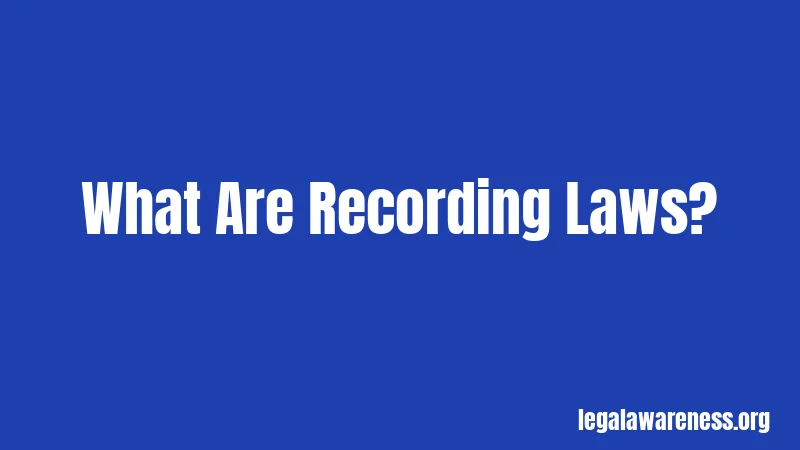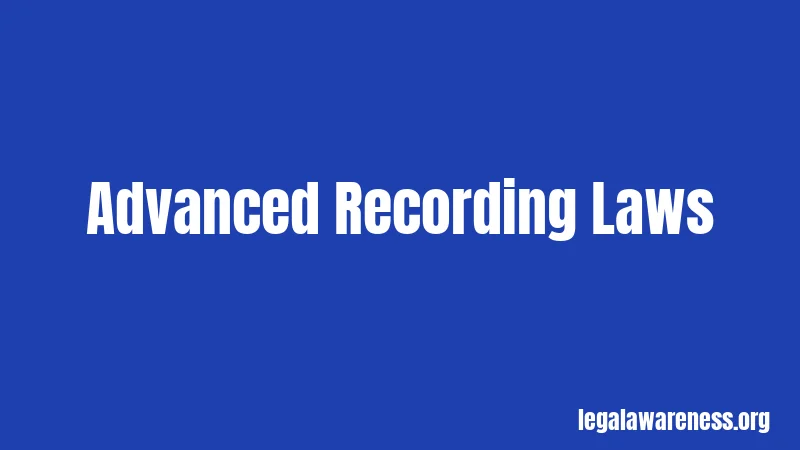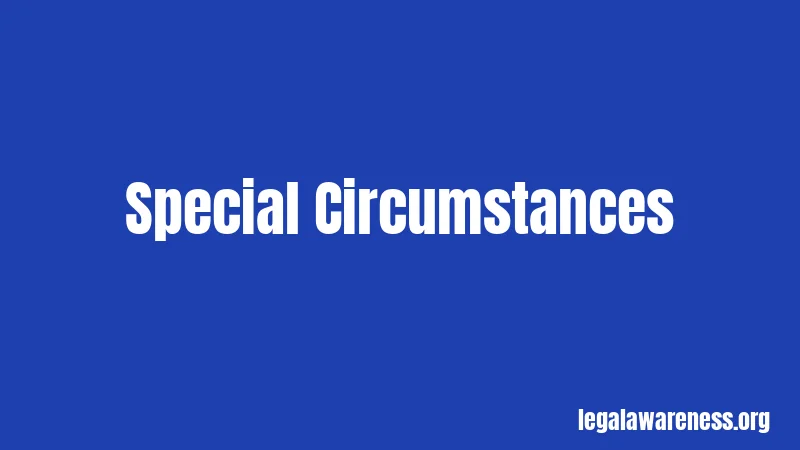Recording Laws in Florida 2026: What You Need to Know
Recording conversations or videos without permission can get you in serious legal trouble in Florida.
This guide explains Florida’s strict recording laws in simple terms. You’ll learn when recording is legal, what penalties you face for breaking the law, and how to stay out of trouble.
What Are Recording Laws?

Recording laws control when you can record other people’s conversations or videos. Florida has some of the strictest recording laws in the United States.
Florida is a “two-party consent” state. This means all people in a conversation must agree before you can record them. Most other states only require one person’s permission.
The laws cover three types of communication. These are phone calls, face-to-face conversations, and electronic messages. Florida’s laws were created in 1969 to protect people from wiretapping and eavesdropping.
Basic Recording Laws
Audio Recording Rules
You cannot record phone calls unless everyone on the call agrees. This applies even if you are part of the conversation. Breaking this rule is a serious crime.
You cannot record face-to-face conversations in private places without everyone’s permission. Private places include homes, offices, and closed meeting rooms.
There is one exception. You can record conversations in public places where people don’t expect privacy. This might include restaurants, parks, or busy streets.
Video Recording Rules
Video recording follows different rules than audio recording. You can record video in public places without asking permission.
You cannot secretly record people in private places like bathrooms, bedrooms, or dressing rooms. This is called video voyeurism. It’s illegal even if you don’t share the video.
Many security cameras record both video and audio. The audio part requires everyone’s permission under Florida’s consent laws.
Advanced Recording Laws

Workplace Recording
Employers can record employees in some situations, but they must follow strict rules. Audio recording at work requires everyone’s consent, including the employee being recorded.
Your employer must tell you before recording any sound in the workplace. This includes break rooms and common areas. They cannot secretly record your conversations.
You cannot record your boss or coworkers without their permission. Even if they’re saying something wrong, secret recording is still illegal.
Security Camera Laws
Home security cameras are legal if you post clear signs that recording is happening. The cameras must be visible and obvious.
You cannot point cameras at areas where people expect privacy. This includes neighbors’ yards, windows, or private property.
Many modern cameras record audio automatically. You must turn off the audio feature or get permission from everyone who might be recorded.
Penalties and Consequences
Criminal Penalties
Recording someone without permission is a third-degree felony in Florida. You can face up to five years in prison and $5,000 in fines.
For first-time offenders with no bad intent, the charge might be reduced to a misdemeanor. This carries up to one year in jail and $1,000 in fines.
Any evidence from illegal recording cannot be used in court. This includes divorce cases and custody battles.
Video Voyeurism Penalties
Video voyeurism has separate, often harsher penalties. If you’re over 19 years old, video voyeurism is a third-degree felony with up to five years in prison.
If you have a prior conviction, the penalty increases to a second-degree felony with up to 15 years in prison.
Video voyeurism involving children is a second-degree felony. You may also be required to register as a sex offender.
Civil Lawsuits
People you record illegally can sue you for money damages. They can get at least $1,000 for each day you violated the law.
You may also have to pay their attorney fees and court costs. These costs can add up to thousands of dollars quickly.
The lawsuit is separate from any criminal charges. You can face both criminal prosecution and a civil lawsuit for the same illegal recording.
Special Circumstances

Law Enforcement Exception
A recent court ruling in 2024 created an exception for recording police officers. You can record phone conversations with law enforcement performing official duties without their consent.
This exception only applies to official police business. Recording officers during personal conversations still requires their permission.
The ruling may not apply to all government employees. It’s unclear if you can record other officials like teachers or city workers.
Emergency Situations
Emergency services like 911 can record calls automatically. You don’t need to give extra permission for these recordings.
Law enforcement can record with court orders or warrants. They don’t need your permission if a judge approves the recording.
Parents may record conversations involving their minor children in some situations. This usually requires reasonable suspicion of abuse or danger.
How to Record Legally
Get Clear Permission
The safest way to record is getting clear permission from everyone involved. You can get permission by asking verbally or in writing before recording starts.
You can also play an announcement before recording begins. For example: “This call is being recorded for quality purposes”.
Some systems use beeping tones during recording to remind people they’re being recorded.
Written Consent
For important recordings, get written permission. This protects you if someone later claims they didn’t agree to recording.
The written consent should clearly state what will be recorded. It should also explain how the recording will be used.
Keep copies of all consent forms. Store them safely in case you need them later.
Public Places Only
You can record video and audio in truly public places without permission. These are places where people don’t expect privacy.
Examples include public parks, busy streets, and large events. Be careful about recording in restaurants or stores, as these may have some privacy expectations.
When in doubt, ask for permission. It’s always safer to get consent than risk breaking the law.
Security and Business Recording
Home Security Systems
Post clear signs that your property has video surveillance. The signs should be visible to anyone entering the area.
Turn off audio recording on security cameras unless you get permission from everyone who might be recorded. This includes delivery drivers, visitors, and neighbors.
Point cameras only at your own property. Don’t record neighbors’ yards, windows, or private areas.
Business Surveillance
Businesses can use video cameras for security in common areas. They must post notices that recording is happening.
Audio recording in businesses requires permission from employees and customers. Many businesses turn off audio to avoid legal problems.
Employee break rooms and private offices may have higher privacy expectations. Get legal advice before recording in these areas.
Technology and Recording
Phone Apps
Many phone apps can record calls automatically. These apps don’t change Florida’s consent laws. You still need everyone’s permission to record.
Some apps claim to be legal in all states. This is misleading because state laws vary. Follow Florida law if you live in Florida.
Delete any illegal recordings immediately. Keeping them can lead to additional charges for evidence tampering.
Smart Devices
Smart home devices often record audio and video automatically. Check your device settings and turn off recording features you don’t need.
Inform guests that smart devices might be recording. This helps you avoid accidentally creating illegal recordings.
Review your privacy settings regularly. Technology companies update their policies and features frequently.
Frequently Asked Questions
Can I record someone threatening me?
No, feeling threatened does not give you legal permission to record without consent in Florida. The two-party consent law still applies even in dangerous situations.
Can I record my spouse without permission?
No, you cannot record your spouse’s conversations without their permission, even in your shared home. Marriage doesn’t remove the consent requirement.
What if I accidentally record someone?
Accidental recording may be a valid defense if your lawyer can prove the recording was truly unintentional. Delete accidental recordings immediately and consult an attorney.
Can my employer record me at work?
Your employer can record video for security purposes but must inform you about any audio recording and get your consent.
Are security cameras always legal?
Security cameras are legal if they’re visible, have proper signage, and don’t record areas where people expect privacy. Audio recording requires additional consent.
Final Thoughts
Florida’s recording laws are strict and serious. Breaking these laws can result in felony charges, years in prison, and expensive lawsuits.
The safest approach is always getting permission before recording anyone. When in doubt, don’t record or ask a lawyer first.
Remember that technology makes recording easier, but it doesn’t change the law. Modern phones and devices can get you in trouble quickly if you’re not careful.
If you think someone has recorded you illegally, contact a lawyer right away. You may have grounds for criminal complaints and civil lawsuits.
References
- Florida Statute 934.03 – Interception and disclosure of wire, oral, or electronic communications prohibited
- Florida Statute 810.145 – Video Voyeurism
- Florida Digital Media Law Project – Recording Law Guide
- Florida Appeals Court Ruling on Law Enforcement Recording – University of Florida
- Reporters Committee for Freedom of the Press – Florida Recording Laws
